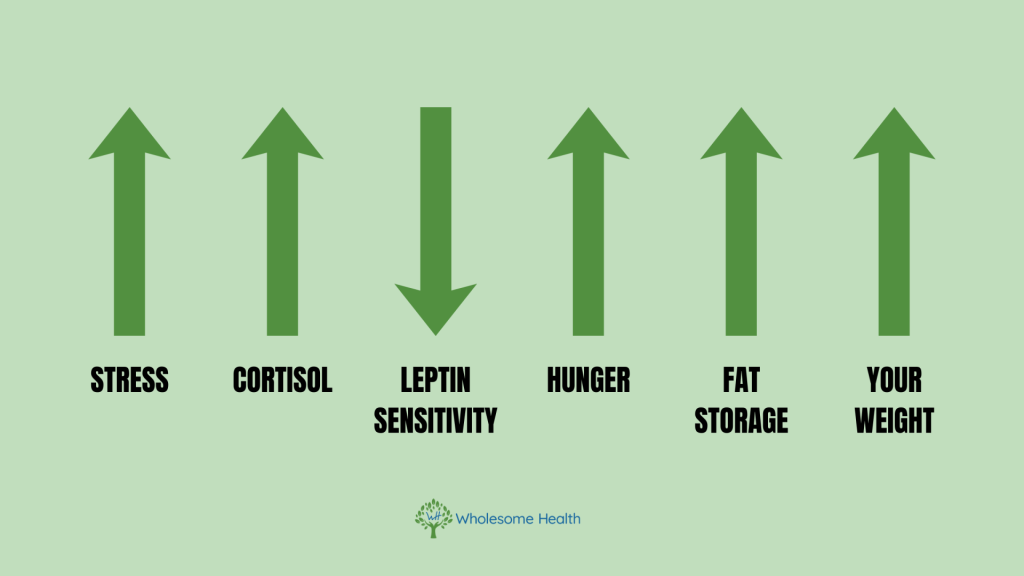When Doing Everything Right Doesn’t Work
You follow your meal plan, exercise regularly, and get enough sleep and yet the scale refuses to budge. You might even feel frustrated, exhausted, or like something is “wrong” with your body.
If this sounds familiar, you’re not alone. Many women over 40 find that weight loss gets harder, even when they are consistent with diet and exercise. The reason often goes beyond calories and workouts: it’s stress.
Stress doesn’t just live in your mind. It affects your hormones, metabolism, cravings, and even the way your body stores fat. Combine that with emotional and spiritual tension, and it’s easy to see why the scale may feel stuck.
“Stress is not what happens to us. It’s our response to what happens. And response is something we can choose.” – Maureen Killoran
In this blog, we’ll explore how chronic stress impacts weight, why it’s particularly challenging for women over 40, and practical strategies, body, mind, and spirit, to finally break the cycle.
How Stress Directly Impacts Weight Gain
1. Cortisol: The Hormone That Makes Weight Stick
Cortisol is your body’s primary stress hormone. In small doses, it helps you respond to challenges. But chronic stress keeps cortisol elevated, triggering a cascade that makes weight loss more difficult:

- Reduced leptin sensitivity: High cortisol impairs leptin signaling, so your brain doesn’t recognize when you’re full.
- Increased hunger and cravings: With leptin signals down, you naturally eat more, often reaching for sugary or high-fat comfort foods.
- Fat storage around the abdomen: Elevated cortisol encourages visceral fat accumulation, storing energy near internal organs.
- Insulin resistance: Your body becomes less efficient at managing blood sugar, making fat burning harder.
2. Visceral Fat: The Dangerous Fat You Can’t See
Not all fat is created equal. Visceral fat surrounds your organs, and it’s far more metabolically active than subcutaneous fat. High levels of visceral fat are linked to heart disease, type 2 diabetes, and hormone imbalances.
Chronic stress increases the risk of visceral fat accumulation, especially in women over 40, because hormonal shifts (like decreasing estrogen) make fat more likely to collect in the abdomen.
Fun fact: Even if you’re at a “normal” weight on the scale, high visceral fat can silently impact your health.
3. Stress Slows Your Metabolism
Stress affects your resting energy expenditure, meaning your body burns fewer calories at rest. Combine that with disrupted sleep, emotional eating, and hormonal shifts, and even a “perfect” diet may not lead to weight loss.
The Emotional and Spiritual Side of Weight Gain
Weight isn’t just physical. Emotional and spiritual stress can be silent saboteurs, keeping your body in a state of tension and making it resistant to change.
Emotional Eating
Many women turn to food to cope with stress, sadness, or boredom. Emotional eating often includes high-calorie, low-nutrient foods, creating a vicious cycle where stress increases weight, and weight increases stress.
Inner Misalignment
Feeling disconnected from your body, ignoring your needs, or constantly “people-pleasing” can elevate stress hormones. When your inner life is out of alignment with your values, your body may hold on to weight as a physical reflection of that tension.

Spiritual Insight
Sometimes the weight we carry isn’t just on the scale, it’s in our hearts, minds, and energy. Learning to listen to your body, honor your emotions, and nurture inner calm can create the conditions for the scale to reflect your inner changes.
Reflection exercise:
Ask yourself, “Is this food nourishing my body, or am I feeding a feeling?”
Spend 5 minutes each day writing about your emotions surrounding food and weight.
Reflection exercise:
- Spend 5 minutes each day writing about your emotions surrounding food and weight.
- Ask yourself, “Is this food nourishing my body, or am I feeding a feeling?”
Breaking the Stress-Weight Cycle: Practical Strategies
Addressing stress and weight requires a holistic approach. Here are some strategies that integrate body, mind, and spirit:
1. Mindful Eating
- Eat without distractions: no phones, no TV
- Focus on hunger cues: stop when full
- Avoid emotional eating by identifying triggers
2. Stress-Reducing Movement
- Yoga, walking, Pilates, swimming, or dancing
- Gentle, consistent movement lowers cortisol and improves mood
3. Prioritize Sleep
- Aim for 7-9 hours nightly
- Evening routines: screen-free time, light stretching, meditation
4. Mind-Body Practices
- Meditation, breathwork, or journaling
- Emotional processing helps regulate cortisol and improves food choices
5. Functional Medicine Support
- Address hormonal imbalances, nutrient deficiencies, and blood sugar issues
- Personalized plans to regulate cortisol, leptin, and metabolism
If you’ve been struggling with stubborn weight despite your best efforts, our Unexplained Weight Gain program can help uncover hidden stressors, and provide a personalized plan to get you back on track.
Additional Tips for Lasting Weight Balance

- Hydration: Proper water intake supports metabolism and reduces cravings.
- Social support: Connecting with others reduces stress and emotional eating.
- Journaling: Track moods, meals, and stress patterns to identify trends.
- Gratitude practices: Daily reflection on positives reduces overall stress.
Key Takeaways
- Chronic stress elevates cortisol, slows metabolism, and promotes visceral fat.
- Emotional and spiritual stress can keep the scale stagnant.
- Mind-body-spirit strategies, combined with functional medicine, are essential for lasting results.
Remember: Weight loss isn’t just calories in vs. calories out, it’s about addressing physical, emotional, and spiritual stressors holistically.
Take Action Today
Weight loss doesn’t have to feel impossible. By understanding how stress impacts your body and implementing holistic strategies, you can finally break through your plateau.
If you’ve been struggling with unexplained weight gain, our Unexplained Weight Gain program helps identify hidden causes and provides a personalized plan to get you back on track. Schedule your discovery session today and start your journey toward balance, wellness, and confidence.

References
- SciDirect. Glucocorticoids, Stress, and Obesity: Mechanisms of Weight Gain. Link
- BSWHealth. Cortisol Belly: How Stress Can Impact Your Weight and What You Can Do About It. Link
- Time. Why Women Gain Weight From Stress. Link
- Mayo Clinic. Weight Loss: 6 Strategies for Success. Link
- Wikipedia. Laurel Mellin, Emotional Brain Training. Link
